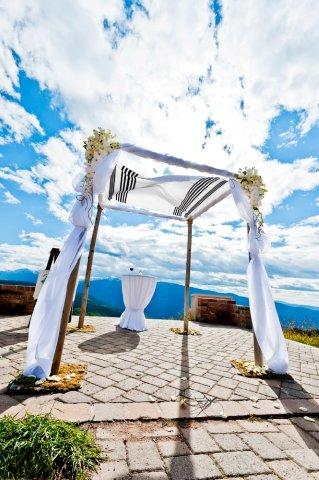A complete set of templates, checklists, and tools for professional wedding planners.
wedding planner's toolbox
Get the tools, templates, and resources to propel your event planning business to success
shop all
Business
Wedding Planning
Marketing
Day in the Life
Self Development
Friday Favorites
Jewish Weddings 101 | Working with a Rabbi or Cantor
Did you know that under Jewish law and legally in most areas, Cantors are allowed to officiate weddings? This opens up options that many wedding planners may not think about.
Here are a few tips to help the working relationship between the wedding planner and Rabbi/Cantors run smoothly:
1. Before finalizing the wedding date check with the Rabbi/Cantor to make sure they are available. Scheduling conflicts are always a concern; but Jewish law dictates certain days and dates when Jews can’t marry.
2. When booking the Rabbi/Cantor it’s important to know the fee doesn’t include a rehearsal. It’s Jewish tradition not to have wedding rehearsals. Don’t expect the Rabbi/Cantor or couple to adapt to the way you usually do things.
3. Don’t be afraid to ask questions. If there is an element of the ceremony that intrigues you or you want to understand better, ask. The Rabbi/Cantor will appreciate that you are interested in learning.
4. Not all Jews practice the same way or have the same cultural traditions. Learn about the couple’s culture within Judaism, their level of observance and the level of observance practiced by the Rabbi/Cantors congregation before assuming things are the way you read about online.
5. More and more Rabbi’s/Cantors these days are performing interfaith ceremonies. If the couple is interfaith don’t assume immediately you should find a non-denominational officiant. Couples don’t have to hire a Rabbi/Cantor; but they don’t have to rule them out either.
6. Make sure the ceremonial objects needed during the ceremony are easily accessible. A small table under the Chuppah is perfect to put them on.
7. Make sure the table is out of the Rabbi/Cantors way. Placing it near the back of the Chuppah usually works well.
8. Be sure that the wine used during the ceremony is kosher.
9. To take number 8 a step further don’t use kosher for Passover wine. Yes, there is a difference. The Rabbi/Cantor will appreciate that you know this.
10. Give the Rabbi/Cantor a copy of the wedding day schedule. You don’t have to include all aspects of the ceremony; but you should include the names of people he is calling up, the music selections and processional/recessional order.
These are just a few things to help your working relationship with the Rabbi/Cantor. Like with all wedding professionals, listen to the Rabbi/Cantor and ask questions about details you don’t understand. It’s the best way to learn and will help you with future Jewish weddings.
What is your experience working with a Rabbi or Cantor?
This is a guest post by Sandra Aaron. Sandra owns Mindless Sophistication Events based in Toronto, Canada. Sandra has been professionally planning corporate, non-profit and social events since 1994. She has a passion for planning Jewish destination weddings; especially in locations where people wouldn’t expect to see a Jewish wedding.
Photo credit: StudioJK
Related Posts

A complete set of templates, checklists, and tools for professional wedding planners.
wedding planner's toolbox
Get the tools, templates, and resources to propel your event planning business to success
shop all
Business
Wedding Planning
Marketing
Day in the Life
Self Development
Friday Favorites
shop
customer care
explore
join
Get the Free Guide: 20 Low-Cost Marketing Ideas for Wedding and Event Planners
Thank you!
Check your inbox for your free marketing guide!
PLANNER’S LOUNGE © 2023 | Website Design by Megan Martin Creative | Terms & Conditions

Thanks for the great tips for working with a Rabbi at a wedding. I’m marrying a Christian woman, but she said it’d be cool to have a Jewish wedding. Like you said, we didn’t rule out a Rabbi for the ceremony, and now we get to experience it!
That is great Ridley! Thanks for commenting!
Thanks for all the info!
I’m getting married this coming summer and I definitely want a rabbi to officiate the wedding… do I NEED a cantor as well though?
Thank you!
I’m not sure Teg. You would have to check with your rabbi.
Sandra,
This is a very good post. A couple of additional comments;
1. I can’t emphasize checking out the wedding date with the cantor or rabbi. Weddings on shabbat [Friday sundown to Saturday sundown] are difficult to find a Jewish officiant. Rosh Hashanah, Yom Kippur and several other times are typically off limits to wedding ceremony.
2. The table under the chuppah: again check with the officiant for their specifications. Different officiants are going to want that table placed differently.
Having worked with hundreds of Jewish ceremonies, from both the officiant and planner side, it is very important for planners to reach out to the officiant to include them in the planning of the ceremony. It is much better to know weeks before the wedding their requirements and not to find out at the last minute.
Anyone attending the ABC annual conference in Palm Beach 2013, I’ll be teaching “The Modern Jewish Wedding” where we will learn about a variety of different rituals and ways to incorporate them into a personalized Jewish wedding.
Thank you so much for your input Yehudit!
Sandra,
Great advice. Especially the part about making sure the table is out of the way!
Thank you for your comment Michele!
Very Helpful Debbie! Thank you
You are welcome! Sandra did such a great job on that guest post.